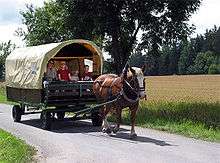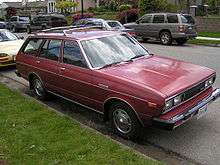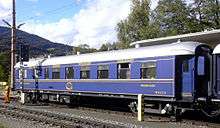Definify.com
Webster 1913 Edition
Wagon
1.
A wheeled carriage; a vehicle on four wheels, and usually drawn by horses; especially, one used for carrying freight or merchandise.
☞ In the United States, light wagons are used for the conveyance of persons and light commodities.
2.
A freight car on a railway.
[Eng.]
3.
A chariot
[Obs.]
Spenser.
4.
(Astron.)
The Dipper, or Charles’s Wain.
☞ This word and its compounds are often written with two g's (waggon, waggonage, etc.), chiefly in England. The forms wagon, wagonage, etc., are, however, etymologically preferable, and in the United States are almost universally used.
Wagon boiler
. See the Note under
– Boiler
, 3. Wagon ceiling
(Arch.)
, a semicircular, or wagon-headed, arch or ceiling; – sometimes used also of a ceiling whose section is polygonal instead of semicircular.
– Wagon master
, an officer or person in charge of one or more wagons, especially of those used for transporting freight, as the supplies of an army, and the like.
– Wagon shoe
, a skid, or shoe, for retarding the motion of a wagon wheel; a drag.
– Wagon vault
. (Arch.)
See under 1st
Vault
.Wag′on
,Verb.
T.
[
imp. & p. p.
Wagoned
; p. pr. & vb. n.
Wagoning
.] To transport in a wagon or wagons;
as, goods are
. wagoned
from city to cityWag′on
,Verb.
I.
To wagon goods as a business;
as, the man
. wagons
between Philadelphia and its suburbsWebster 1828 Edition
Wagon
WAGON
, n.1.
A vehicle moved on four wheels, and usually drawn by horses; used for the transportation of heavy commodities. In America, light wagons are used for the conveyance of families, and for carrying light commodities to market, particulary a very light kind drawn by one horse.2.
A chariot. [Not in use.]WAGON
,Verb.
T.
WAGON
,Verb.
I.
Definition 2026
Wagon
wagon
wagon
English

A horse-drawn, covered wagon.

A station wagon.
Alternative forms
- waggon (UK; dated)
Noun
wagon (plural wagons)
- A four-wheeled cart for hauling loads.
- A freight car on a railway.
- A child's riding toy, four-wheeled and pulled or steered by a long handle in the front.
- (US, Australia, slang) A station wagon (or SUV).
- (slang) A paddy wagon.
- A truck, or lorry.
- (Ireland, slang, dated, derogatory) A derogatory term for a woman; bitch; slapper; cow.
- 1974, in Threshold, Issues 25–27, Lyric Players Theatre, page 96:
- “I’m not like that; I know what you mean but I’m not like that. When you said a field I nearly laughed because I was in a field last week with Ursula Brogan behind the football pitch. We followed Cissy Caffery there and two boys from the secondary. She’s a wagon. She did it with them one after the other, and we watched.”
- 1990, Roddy Doyle, The Snapper, Penguin Group (1992), ISBN 978-0-14-017167-9:
- pages 30–31: —Don’t know. ——She hates us. It’s prob’ly cos Daddy called her a wagon at tha’ meetin’. ¶ Sharon laughed. She got out of bed. ¶ —He didn’t really call Miss O’Keefe a wagon, she told Tracy. —He was only messin’ with yeh.
- 1998, Neville Thompson, Two Birds/One Stoned, Poolbeg:
- page 8: “Well **** yeh, yeh stuck-up little wagon.”
- 1974, in Threshold, Issues 25–27, Lyric Players Theatre, page 96:
Translations
cart
|
|
child's riding toy
|
Derived terms
Terms derived from wagon
|
|
Descendants
Verb
wagon (third-person singular simple present wagons, present participle wagoning, simple past and past participle wagoned)
- (transitive) To transport by means of a wagon.
- (intransitive) To travel in a wagon.
See also
-
 wagon in the 1911 Encyclopædia Britannica.
wagon in the 1911 Encyclopædia Britannica.
Anagrams
Dutch

wagon
Pronunciation
- IPA(key): /ʋaˈɣɔn/
Etymology
From English waggon, from Dutch wagen. The pronunciation was likely influenced by French wagon, which was also borrowed from English.
Noun
wagon m (plural wagons, diminutive wagonnetje n)
- car (a railway carriage, a nonpowered unit in a railroad train)
French
wagon
Etymology
From English waggon, from Dutch wagen.
Pronunciation
- IPA(key): /va.gɔ̃/
- IPA(key): /wa.gɔ̃/ (Belgium)
Noun
wagon m (plural wagons)
- a railway carriage (note that the word voiture is preferred for passenger transport)
Old Saxon
Alternative forms
- wogon
- -wagian, found in witharwagian (to flow back).
Etymology
From Proto-Germanic *wagōną.
Verb
wagon
- to sway
Polish

wagon
Pronunciation
- IPA(key): /ˈva.ɡɔn/
Noun
wagon m inan